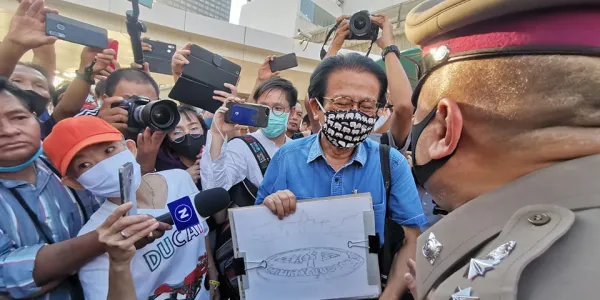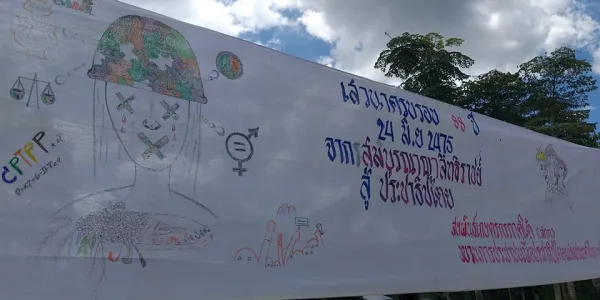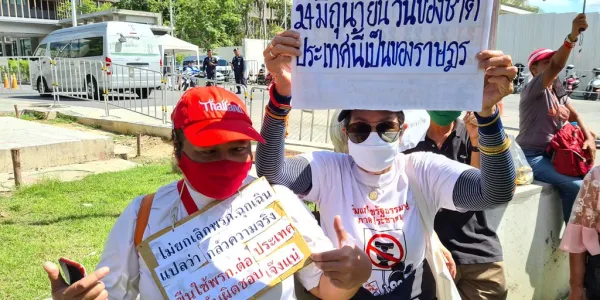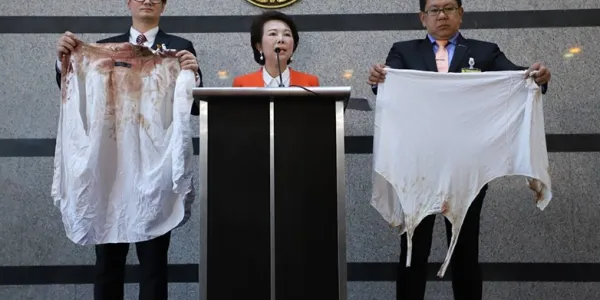By Yiamyut Sutthichaya |
<p>The 24 June 1932 democratic revolution has gained wide public attention on its 88th anniversary. State reaction to the people’s movement celebrating the revolution is based on suspicion and threats, while the military glorify the rebels who tried by force to reinstate the monarchy.</p>
By The Southern Peasants Federation of Thailand (SPFT) |
<p>The Southern Peasants Federation of Thailand (SPFT) online forum was disrupted by the authorities on 24 June. They called for a new constitution to replace the 2017 junta-led version.</p>
By Chatchai Mongkol and Pattanun Arunpreechawat |
<p>Representatives from the People's Party for Freedom (PPF), the 24 June Democracy Movement and the Greater Rangsit Area Labour Union Group submitted a petition to the House of Representatives demanding that the government declare 24 June as Thai National Day and reserve 23-25 June for celebrations as previously designated by <a>the </a>People’s Party.</p>
By Thammachart Kri-aksorn |
By Khaosod English |
<p>A political activist was taken away by soldiers Tuesday morning to a local district office in a bid to prevent him from submitting a petition letter to the prime minister urging he reinstate June 24 as the country’s national day, an official said.</p>
<p>A senior district official who asked not to be named for fear of repercussion, said Ekachai Hongkangwan was taken to Bangkapi district office Tuesday morning in what he described as an attempt to stop the political activist from petitioning Prime Minister Gen. Prayuth Chan-ocha to reinstate June 24 as Thai National Day.</p>
By Kittinun Klongyai |
<p dir="ltr">The 1932 Siamese Revolution was heralded in part by stories, novels and and writing groups. The ideals of the People’s Party were nothing new, compared to movements that had already taken place in the literary field.</p>
<p></p>
By Kongpob Areerat |
<p>Despite relentless attempts by Thailand’s conservative elite to bury the memory of the People’s Party, which brought to an end the absolute monarchy, the legal legacy of the 1932 democratic revolution which gave birth to the first constitution of the nation and laid the foundation of the rule of law lives on.</p>
<p></p>
<p dir="ltr">How much room is there to learn about revolution in Thailand’s education system, a system facing mounting criticism for preaching obedience over creativity? Today, on the 85th anniversary of the 1932 Democratic Revolution, few students are likely to remember the arguable birth of democracy in Thailand.</p>
<p></p>
By Kongpob Areerat |
<p dir="ltr">The disappearance of the 1932 Revolution memorial plaque is the latest of many attempts by the nation’s conservative elites to erase the history of Thailand’s democracy.</p>
<p></p>
<p>Activists have filed a complaint to the police over the mysterious disappearance of the plaque commemorating the 1932 Revolution of the People’s Party, which ended the absolutism of the Chakri Dynasty.</p>
<p>On 16 April 2017, four people lodged a complaint at Dusit District Police Station, Bangkok, urging the police to investigate the disappearance of the brass plaque commemorating<a href="https://prachatai.org/english/category/1932-revolution"> the 1932 Revolution</a>.</p>
<p>As Thais celebrate Songkran Festival, one of the few remaining landmarks commemorating the 1932 democratic revolution has been quietly removed.</p>
<p>On 14 April 2017, the brass plaque commemorating<a href="https://prachatai.org/english/category/1932-revolution"> the 1932 Revolution</a> at the Royal Plaza in Bangkok disappeared.</p>




